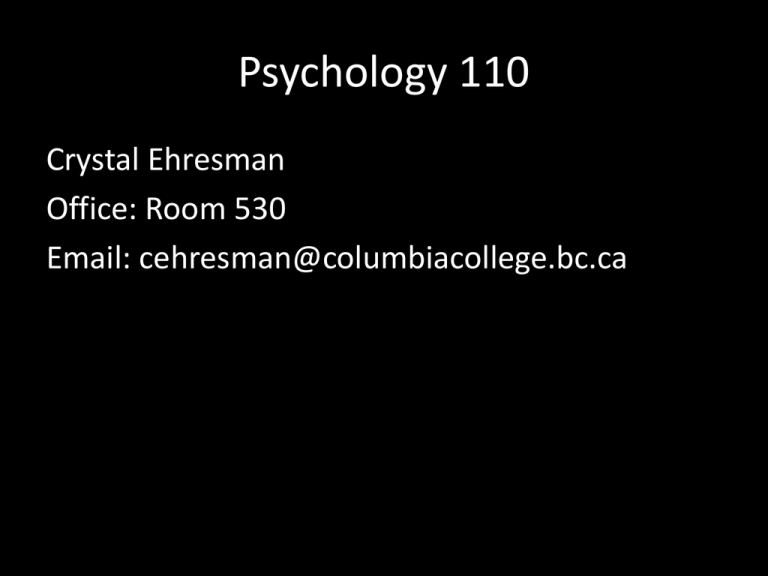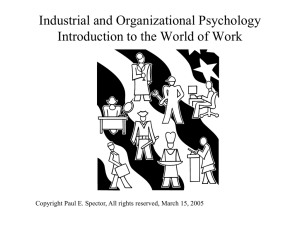wade_ch01_Crystal_2015
advertisement

Psychology 110 Crystal Ehresman Office: Room 530 Email: cehresman@columbiacollege.bc.ca Syllabus • • • • • Participation Assignment Quizzes Final Exam Total = 10% 15% (2 parts @ 7.5% each) 45% (3 @ 15% each) 30% 100% Psych 110 Flow Chart • • • • • • • January 13th January 27th February 17th February 24th March 17th April 2nd April 9th First day of class Quiz #1 Quiz #2 Assignment Part 1 Quiz #3 Assignment Part 2 Last day of class 1-4 1-5 1-6 University of Saskatchewan University of Lethbridge Vancouver Art Therapy Institute Study Skills • How to do well in this course (and school in general) What Is Psychology? Chapter 1 1 - 11 Psychology quiz 1 - 12 Chapter Outline • Psychology, Pseudo-science & Popular Opinion • Thinking Critically and Creatively about Psychology • Psychology’s Present • What Psychologists Do 1 - 13 Psychology • The discipline concerned with behaviour and mental processes and how they are affected by an organism’s physical state, mental state, and external environment • Empirical – Evidence gathered by careful observation, experimentation, or measurement 1 - 14 Pop Psychology 1 - 15 Pop Psychology left right 16 Pop Psychology • Playing classical music to your baby will make him/her smarter 1 - 17 Pop Psychology • Playing classical music to your baby will make him/her smarter • At any point in time, we only use 10% of our brains 1 - 18 Pop Psychology • Playing classical music to your baby will make him/her smarter • At any point in time, we only use 10% of our brains • Full moons cause crimes and craziness 1 - 19 Pop Psychology • Playing classical music to your baby will make him/her smarter • At any point in time, we only use 10% of our brains • Full moons cause crimes and craziness • Human memory works like a video camera 1 - 20 Psychology, Pseudoscience, & Psychobabble • Can you distinguish between psychobabble and empirical psychology? – Psychobabble confirms unsupported popular opinion – Empirical approach makes use of research evidence and challenges opinion 1 - 21 Pseudoscience • • • • associates itself with true science relies on and accepts anecdotal evidence ignores disproof (countering evidence) a theory is not a good theory if it can never make specific predictions • dangerously reduces complexity to simplicity (to a consumer society) Review • Psychology is empirical • Pop psychology and pseudoscience are not 1 - 23 Lie Detection • Pseudoscience and Pop Psychology • https://www.udemy.com/how-to-be-a-human-liedetector/ • http://www.nytimes.com/interactive/2014/03/21/sci ence/can-you-spot-the-liar.html?_r=0 • Empirical Psychology • http://www.ncbi.nlm.nih.gov/pubmed/16859438 1 - 25 Psychology • Uses research and the scientific method to challenge popular opinions and things that are considered common sense. 1 - 26 Can you Predict the Results? • In a classroom, tests can be short or long. What is the effect of test length on student performance? 1) Long tests lead to worse grades 2) Test length is unrelated to grades 3) Long tests lead to better performance 1 - 27 Can you Predict the Results? • Scientists have studied the effect of sugar on children’s behaviours. What seems to be the effect of sugar on behaviour? 1) Sugar tends to make children hyper 2) Sugar has no effect on children behaviour 3) Sugar tends to make children less hyper 1 - 28 Can you Predict the Results? • A woman is often told that if she is trying to lose weight, she should keep a picture of a thin model near by. What is the effect of the picture? 1) Keeping a picture of a thin model nearby helps with weight loss 2) Keeping a picture of a thin model nearby has no effect on weight loss 3) Keeping a picture of thin model nearby leads to weight gain 1 - 29 1 - 30 The Barnum Effect • We have a readiness to accept such general statements as accurate descriptions of ourselves • The sentences are broad and fit everyone • Beware of all-purpose descriptions that could apply to anyone 31 Examples of Pseudoscience • Astrology - Belief that humans are affected by the position of celestial bodies Examples of Pseudoscience • Mental Powers – ESP, mind reading, palm reading, crystal balls, tarot card reading • Conspiracy theories Empirical Science • Peer review 1 - 34 1 - 35 Thinking Critically & Creatively • Critical thinking – The ability and willingness to assess claims and make objective judgments on the basis of well-supported reasons and evidence, rather than emotion or anecdote. – 8 critical thinking guidelines 1 - 36 Critical Thinking Guidelines 1. Ask Questions: Be Willing to Wonder - how, why 2. Define Your Terms - Vague terms lead to incomplete answers 1 - 37 Critical Thinking Guidelines 3. Examine the Evidence - Check the facts available - Identifying bad sources - CRAP test (see hand-out) 1 - 38 Critical Thinking Guidelines 4. Analyze Assumptions and Biases - assumptions are beliefs taken for granted - biases occur when we ignore the alternatives despite evidence Michael Zehaf-Bibeau 1 - 39 Critical Thinking Guidelines 5. Avoid Emotional Reasoning - Emotional conviction alone cannot settle arguments 6. Don’t Oversimplify - Argument by anecdote – generalizing to everyone based on personal experience or a few examples 1 - 40 Critical Thinking Guidelines 7. Consider Other Interpretations - Consider many explanations 1 - 41 7. Consider other interpretations • People who floss regularly live longer • Smokers in high school have worse grades than nonsmokers • People who drink milk were found to be 18 times more likely to develop cancer than people who did not drink milk Junkscience.org Critical Thinking Guidelines 8. Tolerate Uncertainty - Realize not everything has an answer…yet 1 - 43 Critical Thinking 1. Ask questions; be willing to wonder. 2. Define the problem. 3. Examine the evidence. 4. Analyze assumptions and biases. 5. Avoid emotional reasoning 6. Don’t use either/or thinking or overgeneralize 7. Consider other interpretations 8. Tolerate uncertainty. Critical Thinking • Example 1 • Since we have never been visited by aliens, and have recieved no communication from outer space, so we can safely assume that intelligent life exists only on our own planet. 1 - 45 Critical Thinking • Example 1 • Oversimplification (6). An example of either/or thinking. Since you cannot prove a negative, you must also consider other interpretations (7) for the absence of contact with other planets. 1 - 46 Critical Thinking • Example 3 • Harjeet bought a bottle of pain reliever because a TV commercial claimed that most hospitals use it. 1 - 47 Critical Thinking • Example 3 • Analyze assumptions and biases (4). Harjeet is assuming that the hospital selected the pain reliever on the basis of its effectiveness. Perhaps the hospital gets the medication free of charge or at a greatly reduced cost. Define the problem (2). Defining the problem as “pain relief” may be too broad. Perhaps the condition causing Alice’s pain problems calls for a different type of medication. 1 - 48 Critical Thinking • Example 4 • People tend to become forgetful as they get older. This is just one of the natural consequences of aging, and it would be a waste of time to look for specific causes or ways to prevent the problem. 1 - 49 Critical Thinking • Example 4 • Ask questions; be willing to wonder (1). Statement shows a lack of willingness to search for causes and cures. 1 - 50 Critical Thinking • Example 5 • You can tell that Tiana is a lot smarter than her brother. She wears those thick glasses and has a high forehead. 1 - 51 Critical Thinking • Example 5 • Examine the evidence (3).The statement expresses stereotypes for which there is little or no support. 1 - 52 Critical Thinking • Example 6 • A mother was trying to dissuade her son from marrying a girl he had met just three weeks before. The son’s response was “But I know she’s the one; the first time I saw her I began to tremble and see spots before my eyes, and I had flutters in my chest and strange sensations in my stomach. When I’m with her, I feel like I could just take off and fly.” 1 - 53 • Example 6 • Avoid emotional reasoning (5). 1 - 54 Psychology’s Present • Major Psychological Perspectives: 1. Biological perspective 2. Learning perspective 3. Cognitive perspective 4. Socio-cultural perspective 5. Psychodynamic perspective 1 - 55 Biological Perspective • Approach that emphasizes how bodily events affect behaviour, feelings, and thoughts • This perspective involves: • • • • Hormones Brain chemistry Heredity/genetics Evolutionary psychology – How past adaptive behaviours are reflected in present behaviours 1 - 56 Learning Perspective • Approach that is concerned with how the environment and experience affect a person’s (or animal’s) actions • This perspective involves: – Behaviourism: how environmental rewards and punishments influences behaviour – Social-cognitive learning theories: combine elements of behaviourism with thoughts, values, expectations, and intentions. 1 - 57 Cognitive Perspective • Approach that emphasizes mental processes in perception, memory, language, problem solving, and reasoning 1 - 58 Socio-cultural Perspective • Approach that emphasizes social and cultural influences on behaviour • This perspective involves: – Social psychology – study of rules, roles, groups, and relationships – Cultural psychology – study of cultural norms, values, and expectations 1 - 59 Psychodynamic Perspective • Sigmund Freud • https://www.youtube.com/watch?v=hQh9LBIhjyM • 4 minutes 50 seconds 1 - 60 Psychodynamic Perspective • Approach that emphasizes unconscious dynamics within the individual, such as inner forces, conflicts, or instinctual energy • This perspective involves: – Unconscious thoughts, desires, conflicts • Connected to all other areas of psychology, but distinct in its language, methods, and standards of evidence 1 - 61 How do you become a Psychologist? • Undergraduate Degree – psychology or related field, with an Honours thesis, art or science • Master’s Degree – approximately 2 years, funding available and paid some • PhD – approximately 4 years, funding available and paid some (now you are a psychologist!) • Post-doctoral placements – funding available and paid What Psychologists Do • Three categories of professional activities for psychologists: 1. Teaching and doing research in colleges and universities 2. Providing health or mental-health services (psychological practice) 3. Conducting applied research for non- academic settings (business, sports, government, law, and military) 1 - 63 Psychological Practice – Counselling psychologists: help with everyday problems – School psychologists: work with students, parents & teachers to enhance performance and resolve emotional difficulties – Clinical psychologists: diagnose, treat, & study mental and emotional problems 1 - 64 Clinical Psychologists are NOT: • Psychotherapists – Anyone who does any kind of psychotherapy • Psychoanalysts – Individuals who have trained in and practice psychoanalysis • Psychiatrists – Medical doctors who diagnose and treat mental disorders 1 - 65 End of Chapter 1 1 - 66







